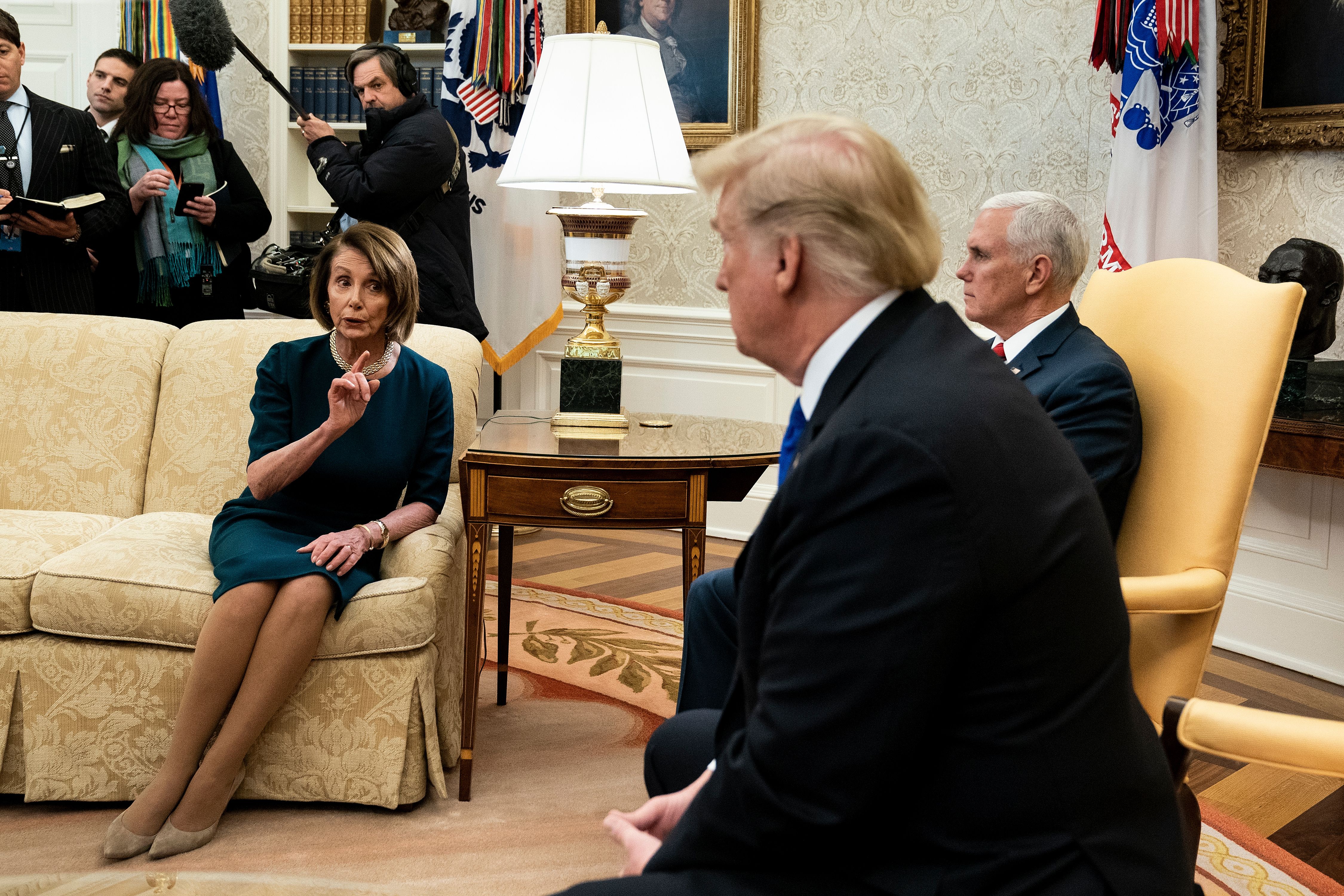
How Pelosi shut down Trump's State of the Union address — again | The Week
- Select a language for the TTS:
- UK English Female
- UK English Male
- US English Female
- US English Male
- Australian Female
- Australian Male
- Language selected: (auto detect) - EN
Play all audios:
Here's the best thing about how House Speaker Nancy Pelosi (D-Calif.) shut down President Trump's State of the Union speech before Congress: For such a high-profile clash, the
stakes were so incredibly low. Trump was going to give a speech on January 29. Now he'll still give the speech, but at a later date. As I said: low stakes. Nevertheless, this was an
important moment. The president on Wednesday tried to bluster and bully his way into giving the speech before Congress, despite a clear signal from Pelosi that the event should be, at the
very least, delayed until the partial government shutdown comes to an end. Pelosi didn't flinch, and Trump ended the day disinvited and defeated, sheepishly acknowledging the
Speaker's prerogatives. SUBSCRIBE TO THE WEEK Escape your echo chamber. Get the facts behind the news, plus analysis from multiple perspectives. SUBSCRIBE & SAVE SIGN UP FOR THE
WEEK'S FREE NEWSLETTERS From our morning news briefing to a weekly Good News Newsletter, get the best of The Week delivered directly to your inbox. From our morning news briefing to a
weekly Good News Newsletter, get the best of The Week delivered directly to your inbox. Trump underestimated Pelosi. He lost. And it didn't cost Democrats a thing. The biggest harm from
shutting down the State of the Union is that Pelosi will have to endure a few more brickbats from Fox News. The payoff, though, is sweet: The president looks silly for escalating a fight he
couldn't finish. Better yet, Pelosi has reminded the American public — and Trump — that Congress is a co-equal branch of government, that there are limits to the president's
power, and that the legislative branch is free to assert its own authority. That's the how the Constitution is designed to work. Trump seems to forget this truth every now and then.
Sometimes members of Congress forget it, too. Very often, members of the House and Senate simply defer to the president on vital matters — particularly on issues of war and foreign policy —
where Congress' power over the budget, treaty approval, and the declaring of war entitles it to a bigger say. Sometimes the deferral happens because legislators are feckless; a vote you
don't take is a vote that won't haunt you in the next campaign. But it also happens because members of the legislative branch seem to put more energy into serving their party than
governing. The result is that you get somebody like Senate Majority Leader Mitch McConnell (R-Ky.), who has already passed legislation to end the shutdown, and done it by a veto-proof
majority — but won't allow a new vote on the same legislation because Trump wouldn't like it. McConnell was more protective of the Senate's authority when President Obama was
in power, of course. Tradition says that a presidential appointment to the Supreme Court at least gets a committee hearing in the Senate, along with an up-or-down vote by the full Senate.
McConnell didn't allow that when Obama appointed Merrick Garland to the court, and the nomination fell by the wayside. That's the way it works sometimes: It often takes divided
government for Congress to assert itself, even a little bit, to challenge and hold the president accountable. Republicans loved it when it worked for them, so it's a bit galling to hear
them now complaining when Pelosi takes similar action. "He has a Constitutional duty to report on the state of the union," Vice President Mike Pence complained Wednesday. True.
But it's well-established that he needn't give that report as a speech before Congress — he could just submit a written report. Is there a tradition and precedent for the speech?
Sure. But there's a tradition and precedent for simply keeping government open, too. President Trump doesn't give deference to tradition; he's not owed it, either. Given
Trump's penchant for getting his own way by creating calamities, Pelosi and Democrats are right to make the president feel some personal pain for the ongoing shutdown. Reward his
behavior this time, and he's likely to return to it again and again. That's no way to govern a country. The stakes were low this time, but that's not true of the larger
shutdown battle. Lines are getting longer at airports. Food is going uninspected. FBI agents say they can't do their jobs properly. Hundreds of thousands of federal employees find
themselves in financial crisis, relying on community food banks and worrying about their mortgages. The economy, as well as the health and welfare of the people of the United States, are
increasingly at risk. The president isn't the kind of guy to recognize the limit of his own authority, even when the lines are clearly drawn. For the sake of our Constitution — and,
perhaps, for finally resolving the shutdown — it is good that Pelosi is there to remind him.